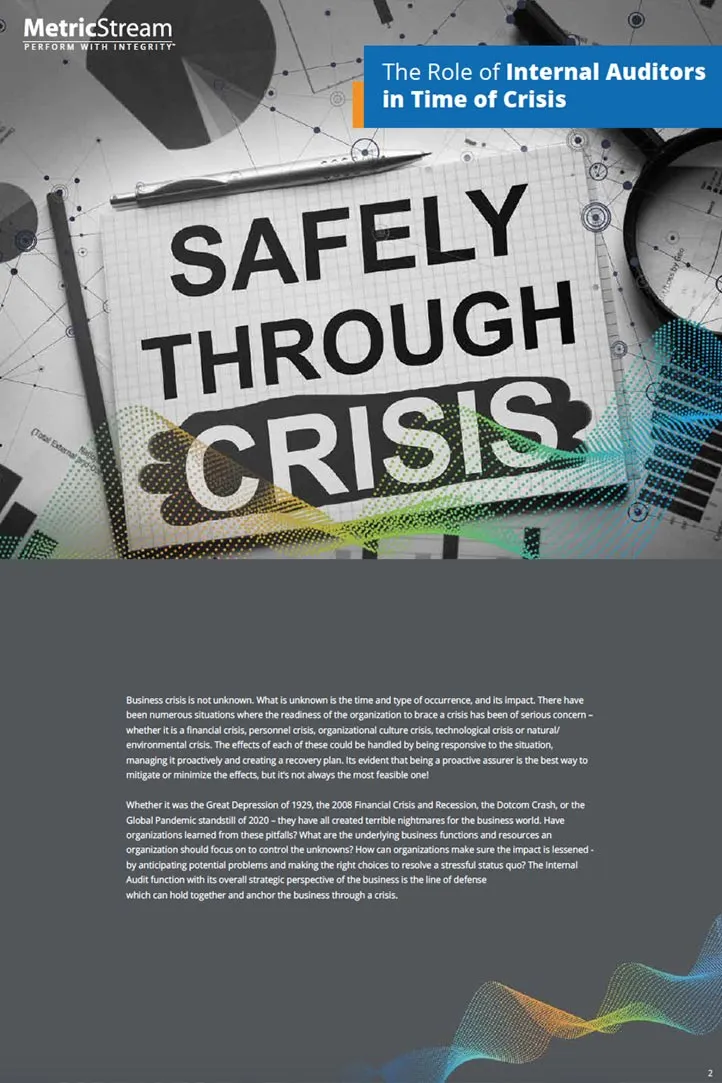
AI-First Connected GRC
Drive a Connected GRC Program for Improved Agility, Performance, and Resilience
Discover Connected GRC Solutions for Enterprise and Operational Resilience
Explore What Makes MetricStream the Right Choice for Our Customers
Discover How Our Collaborative Partnerships Drive Innovation and Success
- Want to become a Partner?
Your Insight Hub for Simpler, Smarter, Connected GRC
The Role of Internal Auditors in Time of Crisis
Business crisis is not unknown. What is unknown is the time and type of occurrence, and its impact. There have been numerous situations where the readiness of the organization to brace a crisis has been of serious concern – whether it is a financial crisis, personnel crisis, organizational culture crisis, technological crisis or natural/ environmental crisis. The effects of each of these could be handled by being responsive to the situation, managing it proactively and creating a recovery plan.
Its evident that being a proactive assurer is the best way to mitigate or minimize the effects, but it’s not always the most feasible one! Whether it was the Great Depression of 1929, the 2008 Financial Crisis and Recession, the Dotcom Crash, or the Global Pandemic standstill of 2020 – they have all created terrible nightmares for the business world. Have organizations learned from these pitfalls? What are the underlying business functions and resources an organization should focus on to control the unknowns? How can organizations make sure the impact is lessened - by anticipating potential problems and making the right choices to resolve a stressful status quo? The Internal Audit function with its overall strategic perspective of the business is the line of defense which can hold together and anchor the business through a crisis.

The Crisis: A Synopsis of Changes
Today, we are in a global economy where demand, supply, logistics, resources, and skills are all interwoven. When crisis strikes, it changes a lot of things in and around a business - the processes, goals and objectives, associated risks, policies and procedures, sales strategies, customer demands, and many more. However, change is not just physical or what can be seen, but also emotional and habit centric. The business may not run as normal and that might just heighten the number of uncertainties and risk dimensions. Since the impact is sudden, the changes are a chain reaction and gauging these ups and downs need an eagle eye on the processes and preparedness.
Internal auditors play a vital role in keeping a business resilient - having a clear understanding of areas of impact, anticipating the severity , displaying agility, and transforming to adapt variance – these are a few aspects where an internal auditor can directly contribute during desperate times. But this cannot be a one-sided effort. There are not many organizations which involve internal audit teams in crucial decision making at the beginning. It is however imperative to understand that the value internal auditors create in ensuring the smooth functioning of the business at any time will only grow with their deeper involvement and insight.
Assurance and Guidance
The role of an internal auditor does not start at a point when all the other lines of defense have completed the observations, defined the risks, funneled the regulations or mapped the policies. In fact, internal auditors are an intrinsic part of the entire spectrum of activities as they possess a unique overview of various facets of the organization, and that’s what makes their contribution towards keeping a business afloat even during a crisis, crucial.
They carry the ability to dive into the moving parts of a business process mechanism and check for silos, ensure all the crisis management plans are created in accordance with the risks, emergency response and communication plans are aligned with the best practices and most importantly with the overall business goals and objectives. They also make sure that the plans are tested, approved and practiced by responsible teams on a timely basis, so that the crisis management plans are not just limited to being documented, but also effective.
How connected or centralized is your organization data?
Do you have a backup plan ready?
If yes, how detailed?
Is every resource well equipped to perform their duties with changed scenarios?
Are required policies and approvals during crisis in place?
Which are the high-risk areas to be impacted and also impact the business Was there any previous history of crisis and impact? What were the lessons learnt?
What are the areas of highest impact?
Is there a BCP defined?
How often are the crisis management plans tested or practiced?
Internal auditors create a resilient business by taking into consideration the above aspects and map them to the appropriate business lines, based on the attributed risk scores for the type of crisis. It is important for internal auditors to set expectations with the stakeholders, but also understand what they are looking for, before deriving a plan.
Dealing with the “Unknown”
It’s imperative to have a clear and thorough plan to avert impact of any potential crisis – which may otherwise have disastrous results – such as losing customers, closing operations, non-recoverable losses, market shrinkage – to name a few. A culture of resilience can be created with proper dissemination of information, constant oversight of the processes, imparting training and awareness, and timely board reporting.
Perhaps the one function which can perform all these activities with ease and act as a fulcrum for the overall crisis resiliency is the internal audit team. Performing these activities is not limited to the flexibility and reach of an Internal Auditor but also to the willingness of the management to invest in such readiness plans. It is a battle between investing capital for such unforeseen events in a proactive manner or waiting for such events to occur and believing that all things can be taken care of on the fly. However, it’s likely that one such event can occur during the lifecycle of a business, and that’s when the true value of having invested in such a plan and advocating the role of internal auditors, will yield positive results.
To a great extent, organizational changes are based on the type of crisis faced. But when the extent of the impact is global, the repercussions can be far reaching and last for a longer duration. So, it becomes important to analyze, prepare, invest, and ensure that the third line of defense is powered to help build a resilient business.

Subscribe for Latest Updates
Subscribe Now





